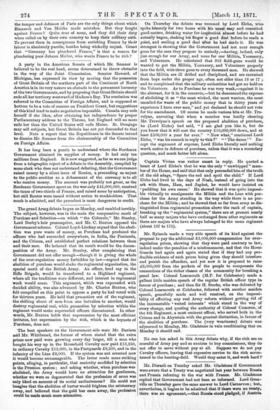The grand Army debate began on Monday, and rambled terribly.
The subject, however, was in the main the comparative merit of Purchase and Selection—on which "the Colonels," Mr. Stanley, Lord Derby's heir presumptive, and Mr. C. Buxton opposed the Government scheme. Colonel Loyd-Lindsay argued that the aboli- tion was pure waste of money, as Purchase had produced the officers who had succeeded everywhere, in India, the Peninsula, and the Crimea, and established perfect relations between them and their men. He believed that its result would be the decom- position of the Army. Mr. Stanley, after complaining that Government did not offer enough—though it is giving the whole of the over-regulation money forbidden by law—argued that the abolition of purchase would shake the regimental organization, the special merit of the British Army. An officer, bred say in the Rifle Brigade, would be transferred to a Highland regiment, where all the traditions were different, and interest in regimental work would cease. This argument, which was expounded with decided ability, was also advanced by Mr. Charles Buxton, who felt compelled on this point to oppose a party he bad voted with for thirteen years. He held that promotion out of the regiment, the shifting about of men from one battalion to another, would destroy regimental zeal, while promotion by selection within the regiment would make superseded officers discontented. In other words, Mr. Buxton holds that supersession by the most efficient irritates, but supersession by the rich, which is the keynote of Purchase, does not.


































 Previous page
Previous page